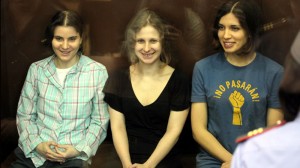
The European Union’s Foreign Affairs chief Catherine Ashton said a “serious question mark” hung over Russian justice and called on Moscow to reverse the judgement.
“This sentence is disproportionate,” Ashton said, adding in an unusually firm reaction: “I expect that this sentence will be reviewed and reversed in line with Russia’s
international commitments.”
Ashton said the case “puts a serious question mark over Russia’s respect for international obligations of fair, transparent, and independent legal process.”
Band members Maria Alyokhina, Nadezhda Tolokonnikova and Yekaterina Samutsevich were each found guilty of “hooliganism motivated by religious hatred” in staging a February 21 “punk prayer” in a Moscow cathedral against President Vladimir Putin.
“This case adds to the recent upsurge in politically-motivated intimidation and prosecution of opposition activists in the Russian Federation,” Ashton said.
The trend “is of growing concern to the European Union” and “runs counter to Russia’s international obligations as regards respect for freedom of expression,” she added.
Ashton said respect for human rights and the rule of law is “an indispensable part of the EU-Russia relationship” and that such a sentence “for a peaceful, if controversial, expression of … views, is deeply troubling.”
Washington called for a review, also voicing concern over the harsh sentences.
“The United States is concerned about both the verdict and the disproportionate sentences…and the negative impact on freedom of expression in Russia,” State Department spokeswoman Victoria Nuland said.
France and Germany took the same line. French foreign ministry spokesman Vincent Floreani said the transgressions were “minor acts” when compared to the punishment while German Chancellor Angela Merkel said the ruling was “not in harmony with the values of European law and democracy.”
An official of the Organization for Security and Cooperation in Europe, Dunja Mijatovic, said authorities in some countries “are taking a more restrictive stance on content considered to be offensive, morally questionable or dangerous for children.”
“Most of the time it is a pretext for censoring content that is simply not mainstream and critical,” she said.
Mijatovioc, the OSCE Representative on Freedom of the Media, added, “Charges of hooliganism and religious hatred should not be used to curb freedom of expression.
A top official of the Council of Europe, Jean-Claude Mignon, voiced his concern.
“In a democracy, the right to freedom of expression may be subject to conditions intended inter alia to protect morals and the rights of others,” Mignon, president of the Parliamentary Assembly of the pan-European rights body which includes Russia, said.
“However, the penalties imposed must be proportionate to the seriousness of the offence,” he added.
Meanwhile rallies in support of Pussy Riot took place in cities including London, Kiev, Sofia, Barcelona, Brussels and Paris.
They bolstered appeals from former Beatles star Paul McCartney, pop icon Madonna and a 10,000 person petition gathered by Amnesty International attacking Putin’s growing crackdown on dissent.
In London, around 50 people gathered at the Royal Court theatre which staged a mini-play entitled “Pussy Riots, the final verdict”, where actresses repeated the three women’s arguments during the trial.
In Kiev, dressed only in shorts and boots, Inna Shevchenko, with “Free Riot” written above her bare breasts, used a chain saw to cut down a towering wooden cross erected in memory of the victims of Stalin’s repression.
Her group Femen “expresses its support and solidarity with its Russian colleagues from the Pussy Riot band the day of the verdict” against them, the group known for topless protests said on its blog.
In Bulgaria, Pussy Riot supporters decorated the soldiers on the Soviet army monument with the band’s trademark coloured balaclavas.
“Pussy Riot are an inspirational symbol of the fight for democracy in Russia,” the activists behind the stunt said in a message emailed to AFP.
“The whole international community, including Bulgarian authorities support them against the attempts of the regime to shut their mouths.”
In Spain, about 50 young protesters rallied outside Barcelona’s emblematic Sagrada Familia church to decry the detention and trial of the Russian group.
In Brussels, 50 people summoned by the Belgian branch of Amnesty International gathered near the Russian embassy and in Paris a protest drew around 200 people, including some young women wearing the coloured cagouls.